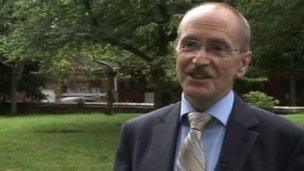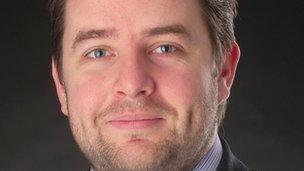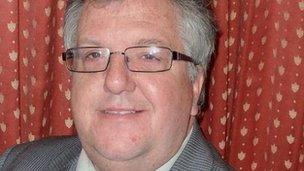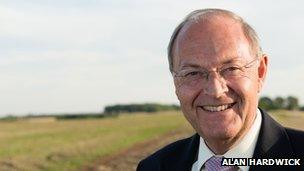Lincolnshire PCC candidates: Funding and anti-social behaviour
- Published
Police and crime commissioner candidates in Lincolnshire have faced questions about how they plan to tackle crime in the county.
During a debate on BBC Radio Lincolnshire the candidates were asked about rural crime, anti-social behaviour and funding.
On 15 November PCCs, as they will be known, will be elected across 41 forces in England and Wales.
They will be responsible for setting priorities and overseeing budgets.
Lincolnshire Police covers an area of more than 2,280 square miles, serving a population of about 646,000 people who live and work in the county.
It is also one of the lowest funded forces in the country.
The candidates are: David Bowles, Campaign to Stop Politicians Running Policing, Conservative Richard Davies, Labour's Paul Gleeson and independent Alan Hardwick.
David Bowles - Campaign to Stop Politicians Running Policing

Mr Bowles said tougher sanctions were needed to deal with repeat offenders
On the question of funding, David Bowles said: "I was absolutely shocked and appalled that our Conservative-led police authority allowed £1.8m of rural police grants to be taken away from them, and hardly raised a murmur."
"I've already linked up with other rural areas to start a campaign to improve our funding.
"It is absolutely staggering that the South East, where crime rates are actually lower than in Lincolnshire, get more money."
Mr Bowles described it as "a scandal" and said lack of funding had never been tackled by politicians, which was one of the reasons he decided to stand for election.
On the subject of anti-social behaviour, Mr Bowles said there were a wide-range of issues which needed addressing.
He said local councils needed to do more to ban street drinking and address licensing issues and more investment was needed in mental health services.
"Just having a police officer turn up is not going to solve the problem," he said.
Richard Davies - Conservative

Councillor Richard Davies promised to try to "reduce fear" and prevent crime
On the question of funding, Richard Davies said: "You don't always fix problems by throwing money at them - we've seen that in the NHS - in real terms spending on policing in the last 10 years has nearly doubled, but Lincolnshire is absolutely under-funded.
"We need more money from the bigger and better funded forces here in rural Lincolnshire."
Mr Davies said he would tackle anti-social behaviour by having officers based in local communities.
"It's a problem we have all over, Lincolnshire is a big county, and we are moving officers around all the time.
"We have over 1,100 police officers - but unfortunately far too many of them are sitting behind computers based in the big police stations.
"For years professional police officers have kidded us - they've told us you don't solve crime by having bobbies on the beat.
"We intrinsically know that's not the case - the fact remains if there were regular foot patrols people are not going to commit offences."
Paul Gleeson - Labour

Paul Gleeson believes the public need better access to the police
On the subject of funding, Paul Gleeson said: "Lincolnshire has the least funding per officer and has the least officers per head of population - our funding is ridiculously small and that has to be fought for."
He added: "I think we are going to struggle to persuade the Conservative-led government to give us more money and we've got to work with other rural forces."
On anti-social behaviour, Mr Gleeson said: "There is already a structure in force [to deal with anti-social behaviour] - police area committees, police panels.
"The trouble is they are not run properly - they are not publicised and people don't know when they are on - but they can be used for good.
"We had an issue in my ward where people were sleeping overnight in a derelict farm building - people from the area came to the police committee and then the police reacted.
"But what we need is the police and crime commissioner to be the voice of the community and hold the chief constable to account."
Mr Gleeson said the public needed better access to the police.
Alan Hardwick - Independent

Alan Hardwick said he would strengthen neighbourhood policing teams
On the subject of funding, Alan Hardwick said: "Lincolnshire is the worst affected - which is a total and utter disgrace."
He said: "If you join forces with other police and crime commissioners you can legitimately go down to Downing Street and speak for the people."
He added that if PCCs worked together the government would have to take notice.
In response to how he would deal with anti-social behaviour Mr Hardwick said he would strengthen neighbourhood policing teams.
"It's all about engaging with the people of Lincolnshire and targeting resources where they can be used to best effect," he said.
"There is a huge disconnect between what the police think the people want and what the people actually want."